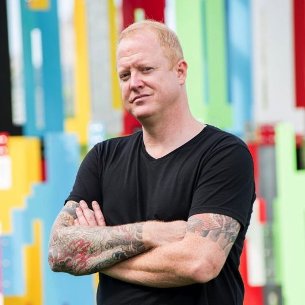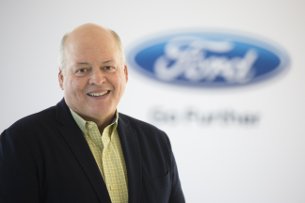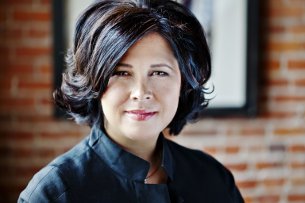How Autonomous Vehicles Could Affect Hog Farming

From the department of unexpected consequences.… The rise of self-driving cars could alter the future of hog production, Canadian futurist Nikolas Badminton recently told an audience of swine farmers. Reason: Autonomous vehicles will be safer, resulting in fewer deaths and therefore fewer human organs available for donation. Enter the medical pig.
Gene-editing technologies under development could create pigs with organs suitable for use in humans, Badminton said. With the trend toward vegetarianism already affecting demand for pork, hog farmers may instead raise the animals for medical consumption.
Read “Self-driving cars could affect pig production: futurist” by Mary Baxter, The Western Producer (May 4, 2017). Note: Badminton has opened a new speakers bureau, Futurist Speaker Agency.
Ford Hires (Another) Futurist

Jim Hackett
The Ford Motor Co. praises its new CEO, Jim Hackett, as a “visionary” who will help the company move forward in developing autonomous vehicles. Hackett joined Ford in 2016 to lead its mobility services division.
Previously, Ford’s futures-orientation had manifested itself in sustainability efforts such as lightweighting the popular F-150 trucks with aluminum instead of steel. But the vehicles have become so popular that, as more are manufactured, more resources are consumed (including both virgin and recycled materials), points out sustainability scholar Carl A. Zimring in a new book, Aluminum Upcycled.
“The most sustainable automobile design of the twenty-first century is not an automobile at all, but a system to distribute transportation services,” Zimring writes. “Automobile-sharing programs such as Zipcar and IGO, and the bicycle-sharing programs of several European and North American cities distribute the services of driving to a wide clientele without the damage of mass production and disposal.”

Sheryl Connelly
Comment: If this is what Hackett’s vision is for Ford, and if he can monetize that vision into services Ford can provide, he may truly earn the name of futurist. But Hackett isn’t the first futurist at Ford. It’s actually in Sheryl Connelly’s job description. Connelly is the company’s manager for global consumer trends and futuring and has given numerous presentations on futurism in her industry. (Disclosure: This writer owns a few shares of Ford stock and has owned only Ford vehicles since the early 1980s.) —CGW
Read Aluminum Upcycled: Sustainable Design in Historical Perspective by Carl A. Zimring of the Platt Institute (Johns Hopkins University Press, 2017).
Opportunity: Startups for Smart Cities
The Singularity University has issued a call for startup companies and entrepreneurs “that apply exponential technologies to help shape better cities,” starting with Columbus, Ohio. “In this intensive 10-week program, you’ll receive high-velocity training, relevant mentoring from the best minds around the world, and help preparing to scale your company,” according to SU. “Finally, you’ll also receive up to $100,000 in seed funding, provided by NCT Ventures.” The accelerator will be from September 12 to November 17 in Columbus. The deadline to apply is July 17. Learn more at Singularity University.
Recent Publications
“The Future of Britain 2022: A Pre-Election Survey on Electoral Priorities” by Rohit Talwar, Alexandra Whittington, and April Koury, Fast Future Publishing (June 5, 2017).
More than 79 percent of respondents to Fast Future’s survey stated that creating a more representative electoral system was a major priority for the future of Britain, with nearly 28 percent suggesting that decentralizing authority and decision making to the local level would help achieve this goal. “The scale of interest in electoral reform may come as the biggest surprise but is a clear reflection of the desire for more representative governance models,” the report states. And despite the Brexit victory a year ago, nearly 42 percent of the Britons responding to the survey said assuring Britain retains access to the European single market is a priority.
See also Joergen Oerstroem Moeller’s analysis of the recent elections: “Time for UK to practise humility: Tarnished May’s unnecessary gamble,” OMFIF—Official Monetary and Financial Institutions Forum (June 9, 2017). Moeller is senior research fellow, ISEAS Yusof Ishak Institute, and Singapore Management University, and a former state secretary at the Danish Foreign Ministry.
“The Internet of Things Connectivity Binge: What Are the Implications?” by Lee Rainie and Janna Anderson, Pew Research Center, Internet & Technology (June 6, 2017).
Despite fears of widespread cyberattacks, “The Internet of Things (IoT) is in full flower,” Rainie and Anderson write. This report on Pew’s “nonscientific canvassing” of more than 1,200 IT professionals, futurists, and others found that 85 percent would choose more connectivity rather than less. But we will increasingly be unaware of that connectivity, commented Jamais Cascio, distinguished fellow at the Institute for the Future. “Think of it as the ‘electricity’ effect,” he said. On the other hand, “the attacks will get much worse,” said writer Cory Doctorow, co-owner of Boing Boing.
“At present, the Internet of Things is more a series of missteps than a grand design, if for no other reason than many of the large players are competitors versus cooperators and accepted protocols are still not agreed upon,” commented Timothy C. Mack, managing principal at AAI Foresight. “As well, the ‘gold rush’ quality of such areas as ‘smart homes’ has led to shoddy design and poor construction of the physical and the digital aspects of this brave new world. As for the loss of critical safety and security through networks trying to interconnect and protect and the same time (with largely the same tools), we should expect many more disappointments in the IoT development saga.”
Moves in the Field
RAND opens Bay Area office: The RAND Corporation has opened an office in San Francisco “to foster collaboration with the region’s leaders and researchers working to solve today’s complex problems—issues including technological change and innovation, social inequality, water resource management, and transportation.” Senior information scientist Nidhi Kalra will lead the new office. Learn more at RAND.
Sweeney joins humanitarian organization: Futurist John A. Sweeney has joined the International Federation of Red Cross and Red Crescent Societies (Geneva, Switzerland) as global futures and foresight coordinator. Learn more at IFRC.
Honors and Milestones
XPRIZE names authors to Science Fiction Advisory Council: The XPRIZE will seek inspiration from more than 60 “visionary storytellers who will lend their expertise in honing our vision of the future.” Among those on the council are Margaret Atwood, Cory Doctorow, Madeline Ashby, David Brin, Brenda Cooper, and Greg Bear. Learn more at XPRIZE.
Silicon Valley Honors Tech Investors: The Silicon Valley Forum has bestowed its annual Visionary Award on five technology investors: DFJ partner Steve Jurvetson; IBM nanotechnology pioneer Don Eigler; Megan Smith, chief technology officer of the United States under the Obama administration; Neri Oxman of the MIT Media Lab; and Linda Rottenberg of Endeavor. Learn more at Silicon Valley Forum.
In Memoriam
Jacque Fresco: Venus Project founder Jacque Fresco died May 18 in Sebring, Florida, at the age of 101. Like Buckminster Fuller before him, Fresco was a big-picture thinker whose passion was solving the world’s greatest problems, including equitable resource distribution. The Venus Project, set about two hours south of Orlando, Florida, realized his vision, with partner Roxanne Meadows, of a cybernetically sophisticated city featuring elegant, spaceship-like buildings. Read the open letter by Roxanne Meadows and the New York Times obituary.
Richard Solomon: RAND Corporation senior fellow Richard H. Solomon died March 13 in Bethesda, Maryland. He was 79. Solomon was a China scholar and is credited with helping open U.S.–China relations and ending conflict in Cambodia. He also led the U.S. Institute of Peace for 19 years, where he helped promote nonviolent conflict resolution. Read the RAND press release and the Washington Post obituary.

